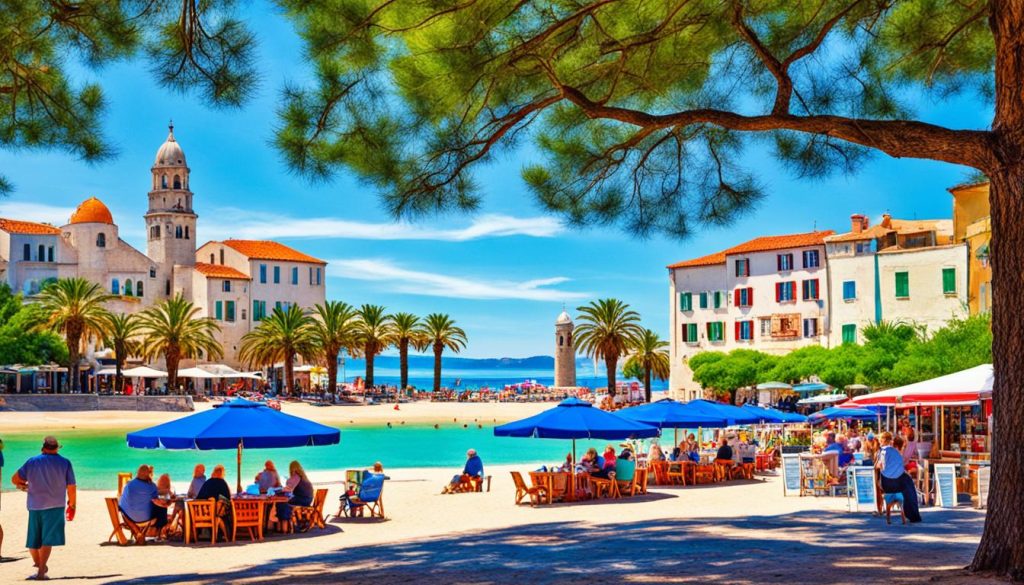France is famous for its focus on a happy balance between work and life. It values employee happiness, offering policies that help. France’s work scene stands out with a 35-hour week, long lunch breaks, plenty of holiday time, and special ‘RTT’ days.
- The French Approach to a Standard Workweek
- The Importance of Lunch Breaks in French Work Culture
- Work-life balance is highly valued in France
- The Midweek Break: How Wednesdays Stand Out
- Generous Annual Leave Entitlements
- The Significance of ‘RTT’ Days in France
- Understanding Public Holidays in France
- The Emerging Trend of the 4-Day Workweek
- The Impact of Remote Work on French Employees
- Source Links
Key Takeaways
- France maintains a 35-hour workweek to promote work-life balance.
- Long lunch breaks are an essential part of the French workplace culture.
- Ample vacation days and ‘RTT’ days contribute to employee well-being.
- French work culture values the harmony between professional and personal lives.
- The ethos of work-life balance is deeply ingrained in the professional life in France.
The French Approach to a Standard Workweek

The French have perfected the balance between work and play. Their workweek encourages taking time for oneself. This has set a great example for maintaining work-life balance.
Understanding the 35-Hour Workweek
In France, people work 35 hours a week. This is key to their professional life. Workers usually work from Monday to Friday, 9 AM to 5 PM.
This schedule helps people have time for personal activities. It makes life outside work more enjoyable.
The 35-hour rule shows France’s dedication to its people’s happiness. It ensures that work doesn’t take over life. This way, workers get to spend more time with their loved ones and on their hobbies.
Industry-Specific Variations
The French workweek is generally 35 hours, but not in all jobs. Hours can vary, especially in sectors like healthcare. These jobs may need longer or more flexible hours.
This flexibility lets each industry operate well while keeping a good work-life balance. It allows businesses to adjust their schedules based on their needs.
The Importance of Lunch Breaks in French Work Culture
In France, lunch breaks are more than just for eating. They are a cherished tradition. These breaks, lasting from noon to 2 PM, let workers relax and enjoy their food. They help maintain a good work-life and meal balance.
Traditional One to Two-Hour Lunch Breaks
Extended lunch breaks are key in French work culture. They signify the value of quality meals and rest. French dining customs highlight the joy of appreciating food with colleagues and friends. This pause is good for both mental and physical health.
Social Benefits of Long Lunch Breaks
Long lunch breaks also have great social advantages. They help colleagues come together, share ideas, and form strong bonds. A relaxed meal encourages teamwork and boosts job happiness. Following French dining rules, like enjoying courses slowly and having deep talks, enhances these social times.
In the end, French lunch breaks perfectly mix work with dining. They offer nourishment and a chance to connect with others.
Work-life balance is highly valued in France

In France, French work-life prioritisation is key. People make sure they have enough leisure time in France. This time is for family, friends, or hobbies. In essence, a balance between work and personal life is essential.
The French professional lifestyle promotes work-life balance perfectly. With a 35-hour week and long lunch breaks, workers feel more content and productive. They get much leisure time in France, showing how the country values life beyond work.
Generous leave and public holidays also enhance work-life balance in France. Such benefits show the strength of the French professional lifestyle. They highlight the importance of well-being in the work ethos in France, leading to a motivated and happy workforce.
The Midweek Break: How Wednesdays Stand Out

In France, the midweek break is a special part of their weekly schedule. Wednesdays see shorter hours for kids and adults alike. It offers a nice pause during the week.
The Historical Origins
The idea of taking Wednesdays off goes back to old religious customs. Kids originally got the day off for catechism classes. Though the religious angle has lessened, the practice remains popular.
Modern-Day Practices
Now, this break is seen as a chance for family and personal time. It shows how important family is in France. With shorter hours on Wednesdays, families can enjoy activities together. It makes their bonds stronger and adds a unique touch to their week.
Generous Annual Leave Entitlements

In France, workers get a lot of holiday time, showing the country’s focus on balancing work and life. This generous system has some key elements worth looking into.
Legal Minimums and Company Benefits
In France, employees are guaranteed at least 25 working days off each year. Many companies offer even more time off as a perk. This means employees can enjoy a good break from work to relax.
Extended Vacations and ‘Les Vacances d’Été’
Summer breaks, or ‘Les Vacances d’Été,’ are a big deal in France. Many businesses close in August so everyone can enjoy a long holiday. It’s all about taking time off to rest and recharge.
The generous holiday policy, with extra perks, is key to French work culture. It makes working in France very appealing.
The Significance of ‘RTT’ Days in France
‘RTT’ days are key to France’s work-life balance. They stand for ‘Réduction du Temps de Travail’ or reducing work hours. These days give workers extra time off. This is for hours worked beyond the usual 35-hour week.
Companies use RTT days to make employees happier. They cut down working hours without losing productivity. It shows how important relaxation and fun are for workers’ health.
RTT days are part of France’s bigger plan for balancing work and life. This includes more holidays for everyone. Together, these efforts create a better and supportive workplace where employees feel appreciated.
RTT days fit well with France’s laws and culture. They highlight the country’s focus on enjoying life. By giving workers extra time off, businesses see better morale and work output.
Today’s work world is constantly changing. France’s emphasis on RTT days shows a progressive way of thinking. It puts employee happiness first by reducing work hours and giving more days off.
Understanding Public Holidays in France
France deeply values its public holidays, integral to its cultural identity. These holidays are a time to celebrate French traditions and bring people together for celebrations.
Bastille Day Celebrations
Bastille Day is on July 14th. It commemorates the storming of the Bastille, a key event in the French Revolution. This day is filled with military parades, fireworks, and celebrations across France.
May Day Observances
May Day falls on May 1st. It celebrates workers’ rights and achievements. People exchange lilies of the valley for luck and joy on this day.
Christmas and New Year Festivities
Christmas time in France is enchanting. Traditions include decorated markets, special foods like bûche de Noël, and Christmas Eve mass. Following Christmas, New Year’s Eve keeps the cheerful spirit alive with feasts and fireworks.
The Emerging Trend of the 4-Day Workweek
In France, the four-day workweek is turning heads. It’s not just a passing trend but a major move towards not only better work flexibility but also improved employee happiness.
Post-Pandemic Shifts in Work Flexibility
COVID-19 changed how we see work. We’re now seeing more remote and hybrid jobs, leading to new ideas for the workweek. French businesses are trying out the four-day workweek. They aim to give their staff more control and a better balance between work and life. This effort shows a strong step toward not just flexibility but also innovation at work.
Case Studies of French Companies
Some well-known French firms have either tried or are trying the four-day workweek. For example, the tech company LDLC Group has seen happier, more efficient workers. Also, in the service industry, companies like Welcome to the Jungle have successfully tested this model. They focus on getting results, not just logging hours. These examples show that changing how we work can make for a better and more productive workplace.
The Impact of Remote Work on French Employees
Remote working has really taken off in France due to the COVID-19 pandemic. This has sped up digital changes within companies, making them quickly adapt to remote policies. As a result, French workers are now enjoying more flexibility in managing their time.
The concept of working from home has become common in France. This change has affected both where people work and how teams communicate. While many find benefits in remote work, it also brings challenges such as keeping work and life separate and dealing with loneliness.
French businesses have updated their remote work policies, with many adopting long-term hybrid models. These policies let employees work partly from home and partly from the office. This approach promises a more flexible and focused work culture in the future, moving away from the traditional office setup.












